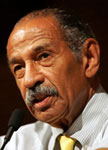- The United States National Health Insurance Act (U.S. Congress/John Conyers)
- Community solutions for improving child health (FCN, 06-16-2005)

NEW YORK (FinalCall.com) – Michigan Congressman John Conyers (D) has been burning up his frequent flier miles holding nationwide hearings on the need for a national health plan.
On Apr. 24, a congressional hearing was convened by Art Without Walls & Acts of Art, The Musician’s Union, The Actors’ Fund, The Harlem Tenants Council, Physicians for Social Responsibility & Black Pride and Physicians for a National Health Plan. Although the hearing was slated as “Health Care and Affordable Housing,” the lion’s share of the testimony centered on health care.
“We come to this forum to say that the tax base we create should be used for health care,” insisted Russell Carmony, a member of Acts of Art. Artists are a main part of the economic engine of America, he further explained to the panel, which included Rep. Conyers, Councilman Charles Barron (D-Bklyn.); Assemblyman Karim Camara (D-Bklyn.); Minister Kevin Muhammad of Muhammad’s Mosque No. 7; Woody King of the Federal Theatre; David Lennon, president of Musicians Union—Local 802, actor and president of the Screen Actors Guild; and Dr. Jamie Torres of Latinos for National Health Insurance.
“What I am hearing from the arts community are pleas beyond health care,” Rep. Conyers observed.
Mr. Barron told the gathering that New York City has a budget surplus of $3.5 billion. “At least a billion of that should be set aside for health care,” he purported.
“We have a healthcare system that is rooted in capitalism,” noted Min. Kevin. “And as long as it is rooted in capitalism, someone will always be at the bottom of the system.”
He said that is why the Millions More Movement has come to birth, to awaken our people to the issues of health care, education, political advancement and artistic and cultural development. “But most important is the introduction of a new health paradigm that expresses the need for diet and exercise at the root of a health care regimen,” he told the audience.
“We want the word ‘profit’ taken out of health care,” insisted Rep. Conyers. “That is why the first issue on my agenda is a national health care plan.”
In 2003, the Michigan representative introduced HR 676, The United States National Health Insurance Act (USNHI), which has 37 co-sponsors.
In a brief summary, posted on the congressman’s home page, it states: “The U.S. National Health Insurance Act (USNHI) is a single payer healthcare system. The bill would create a publicly financed, privately delivered healthcare program that uses the already existing Medicare program by expanding and improving it and making it available to all U.S. residents and all residents living in U.S. territories.”
According to data provided by the congressman, USNHI would be funded by a modest payroll tax of 3.3 percent, with a five-percent health tax on the top five percent of income earners, a small tax on stock and bond transfers, closing corporate tax loopholes and repealing President George Bush’s tax cut. Furthermore, under HR 676, the average costs to employers for an employee making $30,000 per year would be reduced to $1,155 per year, less than $100 per month.
Rep. Conyers was headed for rural Michigan the following day meeting with farmer groups and senior citizens. “This is a political activity that is from the ground, up to the member of Congress, who may not be convinced that they should be at the table helping us get this bill passed,” he told The Final Call.
Some of the most compelling testimony came from poet/artist Amina Baraka, wife of Amira Baraka, who explained that after the killing of her daughter in 2003, she went into a deep state of depression, which then turned into a physical problem. She told the panel that had it not been for her husband’s health insurance from a previous teaching position, she would have not been able to get the care needed.
“I thought it important for me to be here today because we really do need a national healthcare program,” she told The Final Call.
The artist gives so much to the community, and the community ought to be able to give back to the artist, opined Woody King. “The community should have some sort of way to help the artist medically.”
Mae Jackson, of the Health Care Now Campaign, remarked that the hearing marked a grassroots movement of working class people. “This has been one of the few congressional hearings on health care in this area where most of the people testifying were Black,” she observed. “And the other key is that most of the people on the panel represent grassroot leadership in this city.”












